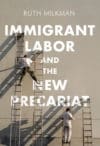Labor

The Dirty Fight for Prop 22 and the Gig Economy
On California’s November 2020 ballot were some contentious and important issues, including Proposition 22, classifying rideshare drivers and app-based delivery workers as independent contractors. Gig economy giants Uber, Lyft, Doordash, and others spent a whopping $111 million on Prop 22. Of course, the companies had a lot to lose. If they were made to treat their drivers or delivery people as employees and compensate them accordingly, they would be bankrupted, they claimed. | more…

It is a testament to the clarity and scope of Mark Jay and Philip Conklin’s vision that A People’s History of Detroit is replete with insights for those trying to make sense of these deeply uncertain and troubling times. In it, Jay and Conklin show that “in order to give a true ‘people’s history,’ one must do more than condemn the malevolence of those in power and celebrate the activists who have struggled for justice; one must also come to terms with the social system in which these people lived. In our case, this means confronting the logic of capital.” | more…

Ruth Milkman’s latest book is a strong scholarly response to the “immigrant threat” narrative that has been central to U.S. politics in the last decades. In Immigrant Labor and the New Precariat, the distinguished labor and migration scholar has a clear goal: to reframe the conversation about migration and increased inequality in the United States, reversing the causal relation that blames migration for the U.S. working class’s current perils. | more…
Left Parties and the European Union
European left parties have, over the last couple of decades, become increasingly critical of political developments in the European Union, particularly as a response to the austerity policies that followed the financial crisis of 2007–08 and the subsequent euro crisis. These were accompanied by high and sustained unemployment and promises of a social pillar that never materialized. Nevertheless, even if criticism of the European Union has sharpened, this has not been well reflected in the political strategies of the left. | more…

Both Toni Gilpin’s The Long Deep Grudge and Michael Goldfield’s The Southern Key offer ample evidence that the grand era of U.S. labor history scholarship is not yet past. The Long Deep Grudge is in equal parts labor history and family reminiscence as Gilpin seeks the fuller story of her father, who played a leadership role in the United Auto Workers union. The Southern Key is in many ways a study of a different variety, but very much of a similarly militant kind. Goldfield, a labor activist veteran himself, draws the big picture of what he sees as the central failure of the U.S. left: the failure to organize the South. | more…

The story of the consumer’s involvement in the sphere of production is not new, as consumers have been providing unpaid labor to and otherwise subsidizing capitalism since at least the mid–twentieth century. Yet, as the economy has evolved so too have the scope and complexity of consumer work. | more…

The Singularity of the Zhoujiazhuang People's Commune
Zhoujiazhuang is singular, being the only de facto people’s commune in China today. At present, Zhoujiazhuang still maintains the political, economic, and social structure that has been essentially in place since 1956. For over sixty years—since ten years before the Cultural Revolution and thirty-eight years after the dismantling of almost all people’s communes in 1982—Zhoujiazhuang has survived as an organizational unit over the same territory comprising the same six natural villages. | more…

The Making of Puhan Rural Community in North China
Originally set up in 1998 in China, the Puhan Rural Community was the first peasant-initiated, cross-village organization established after the collapse of the top-down people’s communes and the implementation of the household responsibility system. Puhan learned a lesson about the exploitation of usurious microfinance and decided that it was capable of establishing a system of mutual aid credit by itself, changing the cultural emphasis on money. Its story of struggling with rural financial organizations opens up a debate on the trap of marketization and monetization, the root causes of loans and debts, the negotiating power of collectives, the production mode of ecological agriculture, and the redefinition of the commonwealth. | more…

Racial Capitalism, the Settler State, and the Challenges Facing Organized Labor in the United States
Organized labor—based on white-exclusive and later white-dominated, though not necessarily exclusive, trade unions—formed itself as part of the settler state, not in the sense of being an apparatus of the state, but in the sense of accepting certain important precepts. The unions took for granted the nature of the settler state and, as such, conceived that the unions were to exist to serve the “legitimate” population, or at least the working class of the legitimate population. | more…

Lengthening hours, lessening pay, no parental leave, scant job security… Never have so many workers needed so much support. Yet the very labor unions that could garner us protections and help us speak up for ourselves are growing weaker every day. In an age of rampant inequality, of increasing social protest and strikes— and when a majority of workers say they want to be union members—why does union density continue to decline? Shaun Richman offers some answers in his book, Tell the Bosses We’re Coming. | more…

My pop was always working on our house, a shack that was all my parents could afford in the great hunger for homeownership that came after the Second World War. But nothing ever quite got finished, either for lack of funds or motivation. But if he wasn’t quite a craftsman himself, he admired craft. He was moved by the effort and intricacy of how things were made. ‘Honey, look at this old wooden chest with these lovely silver handles. Think of all the work that was done to this thing by someone’s hands.’ | more…

In 1950, the mainly Mexican and Mexican-American members of the International Union of Mine, Mill and Smelter Workers Local 890 went on strike against Empire Zinc in southern New Mexico. One of the only fair-haired and pale-skinned union men in meetings and jail was Mine Mill organizer Clinton Jencks. Raymond Caballero’s study, McCarthyism vs. Clinton Jencks, exhaustively details how the federal government brought the entire weight of its repressive apparatus down on the heads of Jencks, his family, and his union siblings. | more…










